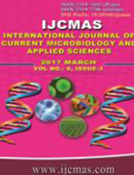


 National Academy of Agricultural Sciences (NAAS)
National Academy of Agricultural Sciences (NAAS)

|
PRINT ISSN : 2319-7692
Online ISSN : 2319-7706 Issues : 12 per year Publisher : Excellent Publishers Email : editorijcmas@gmail.com / submit@ijcmas.com Editor-in-chief: Dr.M.Prakash Index Copernicus ICV 2018: 95.39 NAAS RATING 2020: 5.38 |
University of Baghdad / College of Science / Biotechnology Department, Iraq
This study attempted to determine the prevalence of HBV infection and comparative assessment between serological and molecular diagnoses among 75 samples divided into three groups as treated, untreated and control groups from different cities in Wasit Province, Iraq, during the period from March 2016 to May 2016. The samples were analyzed by ELISA and Real Time – PCR techniques for detecting the prevalence of HBV in patients. The obtained results showed that a total of 50 HBs Ag serum samples collected from HBV infected patients and 25 control were tested by qualitative real-time PCR technique as confirmatory, regarding to patients groups (treated and untreated) the results of direct amplification showed statistically significant importance (P<0.05) in comparison with the serological marker. Results showed 96% positive, 4% negative of treated and untreated groups by quantitative RT-PCR and 88% positive and 12% negative by qualitative RT-PCR. Sixty sera samples were collected from treated, untreated and control groups tested by quantitative real – time PCR HBV DNA. The results pointed out that 25 samples for each treated, untreated, and control groups; samples results were found 25 untreated (100%) and treated samples (85 %) positive; and treated samples (15%) negative and 25 control samples (100%) negative. The results were identical between qualitative RT-PCR and quantitative RT-PCR tests performed. ELISA Test System is a qualitative enzyme-linked immunosorbent assay (ELISA) for the detection of HBs Ag human serum or plasma that appears in virtually all individuals infected with HBV and is an accurate serological marker of current and past infection. ELISA procedures provide a means for routinely detecting antibodies to specific antigens. However, PCR amplification of virus DNA is potentially a more sensitive assay.
 |
 |
 |
 |
 |